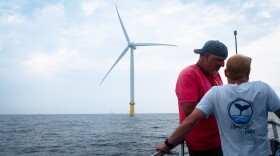Maryland-based Enviva is the world's largest producer of industrial wood pellets, which are shipped to Europe and Asia to be burned in place of coal for electricity.
The company has 10 plants across the Southeast, including four in eastern North Carolina and one in South Carolina.
Enviva warned in November that it faced massive losses because it has long-term contracts to deliver pellets at fixed prices, but prices have collapsed. After missing debt payments in January, the company this week asked a federal court in Richmond to approve a reorganization under Chapter 11 of the federal bankruptcy law. Enviva says it has deals with creditors and new investors to reduce its debt by $1 billion and help it stay in business. It also halted plans for a new Mississippi pellet plant, but expects to continue construction of one in Alabama. If the court approves, Enviva hopes to complete the restructuring by the end of the year.
Glenn Nunziata became Enviva's interim CEO last fall when the financial troubles were first announced. He said in a press release Tuesday night that the bankruptcy and agreements will strengthen the company.
"These agreements with our lenders and noteholders represent a significant milestone in the ongoing process to transform our business, as we focus on improving profitability, reducing costs, enhancing asset productivity, and optimizing our capital structure," Nunziata said.
"We look forward to emerging from this process as a stronger company with a solid financial foundation and better positioned to be a leader in the future growth of the wood-based biomass industry. We appreciate the support of our lenders, our vendors, and our customers, and the tremendous efforts of our entire team as we continue to execute our transformation plan.”
Enviva said the reorganization would include cost-cutting, but gave no details about potential plant closings or layoffs.
The company has grown rapidly in its 20-year history, mainly because of policies in Europe and elsewhere that treat wood pellets as renewable energy and a way to fight climate change.
But it also has been controversial. Many environmental groups oppose the logging of forests across the Southeast that feeds Enviva's plants. They say the plants cause pollution, noise and traffic, and are typically located in areas with high poverty rates and large minority populations.
And while the company touts its pellets as a clean alternative to coal, researchers have argued that wood pellets may be even dirtier than coal, when deforestation, production and transportation are factored in.
"Enviva’s financial collapse demonstrates what we have argued for years: the biomass energy industry is not financially viable,” Heather Hillaker, a senior attorney at the Southern Environmental Law Center, said in a press release Wednesday. "Enviva’s bankruptcy wasn’t caused by just one or two bad contracts, it’s because of a failing industry model that pollutes communities, hurts the climate, and is dependent on government handouts."
Asheville-based Dogwood Alliance said in a statement Wednesday, "The company's greenwashing tactics and lack of transparency has finally caught up."
“Dogwood Alliance will continue to support the communities that have been affected by Enviva’s damaging operations,” said Dogwood Alliance executive director Danna Smith. “We remain steadfast in our commitment to work together with these communities. Together we will advance economic solutions that work for people and nature.”
Enviva's share price has fallen more than 90% since its financial problems came to light. This week they have been trading under $1, down from a high of nearly $88 in 2022.








